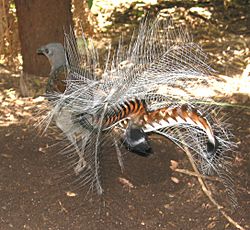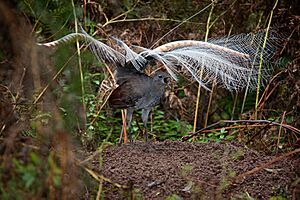Lyrebird facts for kids
Quick facts for kids Lyrebirds |
|
|---|---|
 |
|
| Superb Lyrebird | |
| Scientific classification | |
| Kingdom: | |
| Phylum: | |
| Class: | |
| Order: | |
| Suborder: | |
| Family: |
Menuridae
|
| Genus: |
Menura
|
| Species | |
Lyrebirds are amazing birds that live on the ground in Australia. There are two types, or species, of lyrebirds. You can find them in the forests of eastern Australia, especially in rainforests. Some were even brought to Tasmania a long time ago in the 1800s. They live in places like Victoria, New South Wales, and southeast Queensland.
Contents
What Lyrebirds Eat
Lyrebirds find their food on the ground. They usually search for food by themselves. They eat many kinds of small creatures without backbones, called invertebrates. This includes insects like cockroaches, beetles (both grown-ups and young ones), earwigs, and fly larvae. They also eat adult and young moths.
Other foods they enjoy are centipedes, spiders, and earthworms. Sometimes, they might eat stick insects, bugs, or even small lizards and frogs. They also eat seeds once in a while. Lyrebirds find their meals by scratching through fallen leaves on the forest floor with their feet.
Lyrebird Sounds and Mating
Lyrebirds are famous for their incredible ability to copy sounds. They can mimic many natural and human-made noises from their surroundings. Since they live on the ground in thick bushes, male lyrebirds use their amazing sounds to get attention. When a female comes close, the male then shows off his beautiful tail feathers.
This is how they find a mate: the male lyrebird defends an area. He sings and displays his feathers to attract a female. The female then chooses her mate.
How Lyrebirds Mimic Sounds
Lyrebirds learn the sounds they copy from their local environment. This includes calls from other birds. It takes young lyrebirds about a year to learn all their different sounds. Female lyrebirds can also mimic sounds, but they are not as skilled as the males.
Some classic lyrebird imitations include human sounds in the forest. They can copy car alarms, camera clicks, and even the sound of chainsaws used for logging!
Lyrebird Reproduction and Life Cycle
Lyrebirds have a long breeding cycle. They also live for a long time, sometimes up to thirty years! They start having babies later in life compared to other passerine birds (which are often called songbirds). Female Superb Lyrebirds begin breeding when they are five or six years old. Males start when they are six to eight years old.
Male lyrebirds protect their territories from other males. These territories might include the nesting areas of up to eight females. In his territory, a male builds or uses special spots to display his feathers and sing.
Each female builds a messy nest, usually close to the ground in a damp valley. She lays only one egg. The female is the only parent who sits on the egg to keep it warm for over 50 days until it hatches. She is also the only one who takes care of the lyrebird chick.
Images for kids
-
Menura superba – superb lyrebird (1800) by Thomas Davies
-
John Gould's early 1800s painting of a superb lyrebird specimen at the British Museum
See also
 In Spanish: Aves lira para niños
In Spanish: Aves lira para niños
 | Kyle Baker |
 | Joseph Yoakum |
 | Laura Wheeler Waring |
 | Henry Ossawa Tanner |





